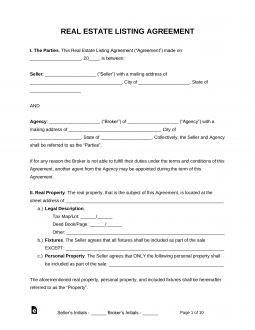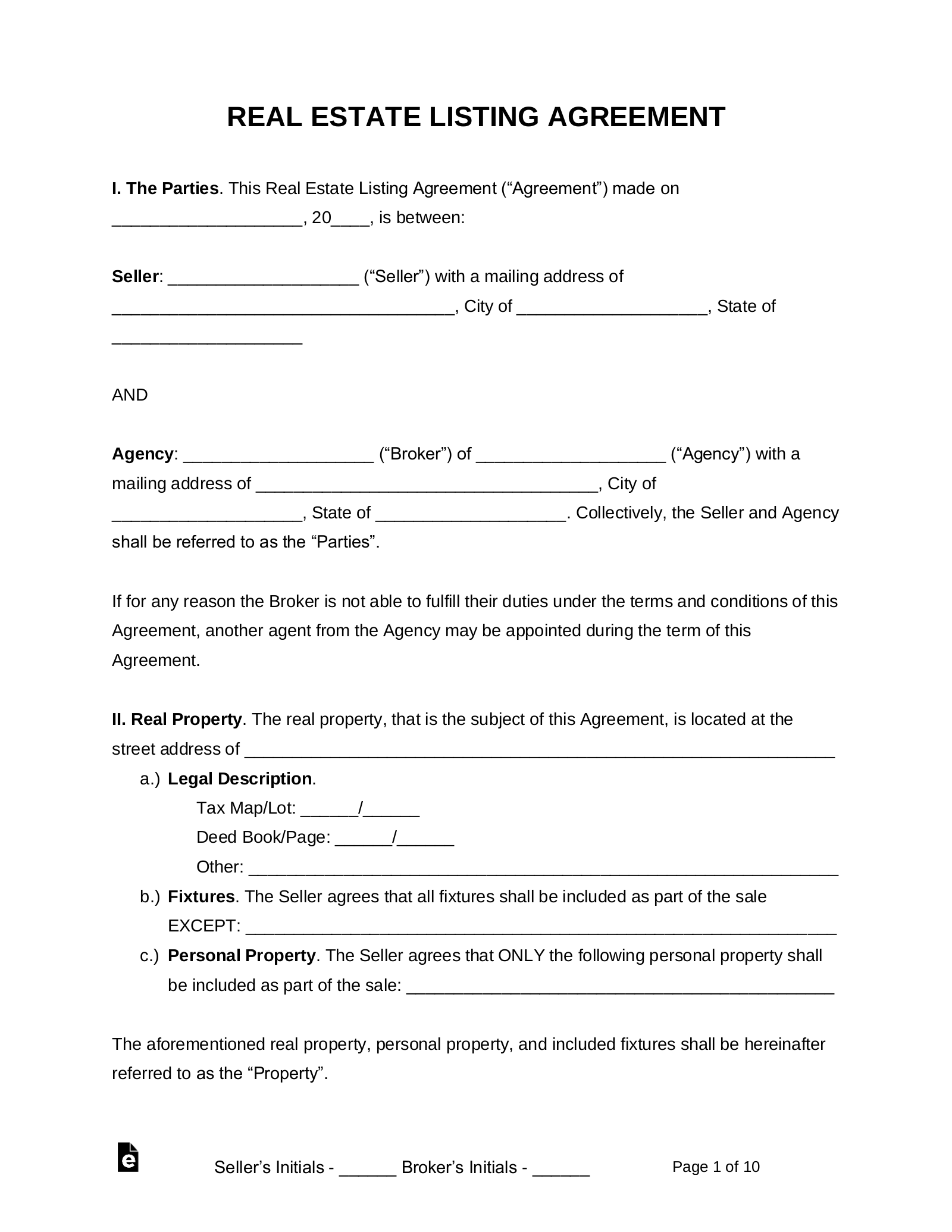Updated February 01, 2024
A listing agreement is a contract between a property owner and a listing real estate agent hired to sell the residential property in exchange for a percentage of the sales price. The commission is typically paid at the time of closing.
Multiple Agents
If there are two agents involved on each side, the total commission is to be shared based on the agreed-upon terms.
By State
- Alabama
- Alaska
- Arizona
- Arkansas
- California
- Colorado
- Connecticut
- Delaware
- Florida
- Georgia
- Hawaii
- Idaho
- Illinois
- Indiana
- Iowa
- Kansas
- Kentucky
- Louisiana
- Maine
- Maryland
- Massachusetts
- Michigan
- Minnesota
- Mississippi
- Missouri
- Montana
- Nebraska
- Nevada
- New Hampshire
- New Jersey
- New Mexico
- New York
- North Carolina
- North Dakota
- Ohio
- Oklahoma
- Oregon
- Pennsylvania
- Rhode Island
- South Carolina
- South Dakota
- Tennessee
- Texas
- Utah
- Vermont
- Virginia
- Washington
- Washington, D.C.
- West Virginia
- Wisconsin
- Wyoming
By Type (6)
Business Listing Agreement – For an entity seeking to sell their business with the assistance of an agent.
Buyer Agency Agreement – For an individual interested in purchasing a commercial or residential property.
Exclusive Agency Listing Agreement – Paid a commission if the property was sold to a buyer introduced by the agency.
Exclusive (Right to Sell) Listing Agreement – Gives an agent the sole right to sell a property on behalf of a seller for a specific time period (usually 6 to 12 months).
Net Listing Agreement – A net listing agreement is when the agent’s commission is the excess of funds above a fixed number. For example, the seller says they want $275,000, anything over that amount is the commission to the agent. Unfortunately, this practice can lead to unethical issues and is banned in some states (not offered on eForms).
Open Listing Agreement – Allows an agent to sell a property with the condition that if the seller, or other parties, sell the property, the agent is not entitled to a commission.
Table of Contents |
Listing Agreement Addendums
Agency Disclosure Forms – Required in most states to inform the role of the agent and their duties as an agent.
Lead-Based Paint Disclosure – Required to be attached to any purchase agreement per federal law. Commonly completed at the time of authorizing the listing agreement.
Property Disclosure Statement – In most states, a seller of a property is required to disclose any material defects. This will be helpful to potential buyers when viewing the property online.
Agency Disclosure
In most states, the real estate agent will be required to have their client sign a waiver stating that they are aware of the agency relationship under a listing agreement. This is commonly authorized at the time of signing the listing agreement and attached with each party receiving an original copy.
Agency Disclosure Forms by State
Real Estate Agent vs. Realtor
A real estate agent is an individual licensed in their respective state (only) to assist buyers, sellers, lessors, and lessees in exchange for a commission.
A realtor is a licensed real estate agent who is also a member of their local association of realtors. The realtor designation gives access to benefits, such as the MLS, which provides a database of active listings, form software, and e-signature.
Verify a Real Estate Agent
It’s important for real estate agents and their clients to verify that an agent is currently active in the state and allowed to facilitate real estate transactions. In order to verify, select a state in the directory below:
- Alabama
- Alaska
- Arizona
- Arkansas
- California
- Colorado
- Connecticut
- Delaware
- Florida
- Georgia
- Hawaii
- Idaho
- Illinois
- Indiana
- Iowa
- Kansas
- Kentucky
- Louisiana
- Maine
- Maryland
- Massachusetts
- Michigan
- Minnesota
- Mississippi
- Missouri
- Montana
- Nebraska
- Nevada
- New Hampshire
- New Jersey
- New Mexico
- New York
- North Carolina
- North Dakota
- Ohio
- Oklahoma
- Oregon
- Pennsylvania
- Rhode Island
- South Carolina
- South Dakota
- Tennessee
- Texas
- Utah
- Vermont
- Virginia
- Washington
- West Virginia
- Wisconsin
- Wyoming
Listing Agent vs. Buyer’s Agent
A listing agent is hired by the seller to assist in the marketing and negotiating of their property.
A buyer’s agent, also known as a “selling agent,” is hired by a buyer to help find and negotiate a property.
Referrals
It is common in the real estate community for an agent to refer a client to another agent. Under this circumstance, the referring agent is commonly paid 25% of the total commission. When a client is recommended to another agent, a referral agreement is required to be signed.
How to List and Sell Property (9 steps)
- Make a List of Potential Clients
- Begin Cold-Calling
- Compare Sales Data
- Write the Listing Agreement
- Gather Required Disclosures
- Marketing the Property
- Receiving an Offer
- Buyer Gets the Property Inspected
- Attending the Closing
A real estate agent is a salesperson. Therefore, the first party that is needed for them to “sell” are their clients, the homeowners. An agent is able to represent potential buyers, but the majority of prominent agents have what are known as “listings,” which are various properties that the agent has listed for sale.
2. Begin Cold-Calling
 Once a list has been made, it should be entered into Microsoft Excel or Google Sheets in order to keep track of all communication that is made. It’s best to understand the needs of every homeowner and, in most cases, they are being contacted by multiple agents in the area seeking their business.
Once a list has been made, it should be entered into Microsoft Excel or Google Sheets in order to keep track of all communication that is made. It’s best to understand the needs of every homeowner and, in most cases, they are being contacted by multiple agents in the area seeking their business.
Therefore, it’s best to only attempt to schedule the meeting over the phone.
3. Compare Sales Data
 After scheduling a meeting with the homeowner, the agent should begin to prepare and gather sales data in the area of the property. This can be done by using the agent’s local multiple listing service, or simply “MLS” (if the agent is a realtor), or by using Zillow.com and local assessor’s data. Find out how the home compares with those that have recently sold.
After scheduling a meeting with the homeowner, the agent should begin to prepare and gather sales data in the area of the property. This can be done by using the agent’s local multiple listing service, or simply “MLS” (if the agent is a realtor), or by using Zillow.com and local assessor’s data. Find out how the home compares with those that have recently sold.
4. Write the Listing Agreement
 This is a basic agreement that was most likely taught in real estate school prior to obtaining a real estate agent license. The agreement outlines payment and the rights of the real estate agent such as:
This is a basic agreement that was most likely taught in real estate school prior to obtaining a real estate agent license. The agreement outlines payment and the rights of the real estate agent such as:
- Commission Payment (%)
According to RealTrends, the average commission in 2017 was 5.12%. This does not mean the agent shouldn’t ask for more but is a good resource to know when walking into the meeting.
- Exclusive Right-to-Sell
The agent should try to get an exclusive right-to-sell the property. This means that no matter how the property sells during the listing period the agent will be due a commission.
- Time-Period
The agent should request to have the listing for 6 to 12 months. This will give the agent more than enough time to properly market the property.
- Signage
Oftentimes, an owner will not want a sign in front of the property. Some data estimate that an average of 7% of buyers are found through a “for sale” sign in the front yard. The importance of this also is determined by the traffic count on the street where the home is located.
5. Gather Required Disclosures
 It’s important to get as much information out of the way in the meeting with the homeowners as possible. As such, all required disclosures, such as the property disclosure statement, agency disclosure statement, and any other state or locally required document should be completed at this time.
It’s important to get as much information out of the way in the meeting with the homeowners as possible. As such, all required disclosures, such as the property disclosure statement, agency disclosure statement, and any other state or locally required document should be completed at this time.
6. Marketing the Property
 After the listing agreement has been signed by the homeowners, it’s time to market the property by any means necessary. This should involve the following:
After the listing agreement has been signed by the homeowners, it’s time to market the property by any means necessary. This should involve the following:
- Place the Home for Sale Online
The agent should list the property on the Multiple Listing Service (MLS), which will place the home on Realtors.com, Zillow.com, Trulia.com, and more.
- Have an Open House
The property should be shown to the public via an open house. This will allow anyone who is looking to purchase a home to be able to preview the property without having to make an appointment. Use an open house sign-up sheet to follow up and see if any of the potential buyers had an interest or if they need representation themselves.
- Stage the Property
In some cases, the home is not properly furnished to best show how the property should look and feel. Therefore, the use of a designer may be a good investment by the homeowners or agent to paint rooms or rent furniture that matches the intended buyer.
Any and all attempts should be made to not only attract a buyer but get the maximum price for the home.
7. Receiving an Offer
 After prospective buyers are shown the home and it is priced accordingly, the offers should begin to start. Some will be “lowball” and others will be closer to the asking price of the seller. When an offer does come through, it will be in the form of a purchase agreement, and will usually have an offer span of three to five business days for the seller to respond.
After prospective buyers are shown the home and it is priced accordingly, the offers should begin to start. Some will be “lowball” and others will be closer to the asking price of the seller. When an offer does come through, it will be in the form of a purchase agreement, and will usually have an offer span of three to five business days for the seller to respond.
The seller has three options:
- Acceptance – Accept the terms and conditions put forth by the buyer and close the transaction within the stated period.
- Counter-Offer – Accept some or most of the terms provided by the buyer although changing some of the details, usually the price and non-refundable deposit.
- Reject – This is in the case when the offer was so low there is no point in returning with a reasonable counter-offer. This is only applied when the offer was an insult to the value of the property.
If an offer is accepted, the deal is not valid until the buyer has been given notice that the offer has been accepted by the seller.
8. Buyer Gets the Property Inspected
 After the home is under contract, the buyer will begin their due diligence period. In most cases, the buyer will be seeking to have the property inspected to ensure all plumbing, electrical, and exterior portions of the residence are in sound condition. If anything that was not mentioned in the property disclosure statement is found, depending on the terms of the agreement, the buyer may be able to cancel the purchase agreement without losing their deposit.
After the home is under contract, the buyer will begin their due diligence period. In most cases, the buyer will be seeking to have the property inspected to ensure all plumbing, electrical, and exterior portions of the residence are in sound condition. If anything that was not mentioned in the property disclosure statement is found, depending on the terms of the agreement, the buyer may be able to cancel the purchase agreement without losing their deposit.
9. Attending the Closing
 After the buyer has received financing, unless they were paying cash, a closing date will be scheduled. This will involve real estate attorneys on both sides as well as the real estate agents, title companies, and any other parties that should be in attendance. At the closing, all documents will be authorized, including the deed, which will officially transfer the property into the buyer’s name. After the closing has concluded, the deed will be filed with the Registry of Deeds, and the transaction is complete.
After the buyer has received financing, unless they were paying cash, a closing date will be scheduled. This will involve real estate attorneys on both sides as well as the real estate agents, title companies, and any other parties that should be in attendance. At the closing, all documents will be authorized, including the deed, which will officially transfer the property into the buyer’s name. After the closing has concluded, the deed will be filed with the Registry of Deeds, and the transaction is complete.
For Sale By Owner (FSBO)
A for sale by owner, commonly known as an “FSBO,” is a property that is attempted to be sold by the owner of the property. FSBOs are also a common target by real estate agents for cold-calling and marketing in an attempt to get the property as a listing. Therefore, if an owner of a property is seeking to sell it on their own, they should be prepared to handle the bevy of calls and emails by agents in their area.
Average Real Estate Commission
The average real estate commission in 2020 was 4.94%, according to Real Trends. This does not mean the agent shouldn’t ask for a higher percentage or accept a lesser amount. There are many factors that determine the commission rate such as:
- The Market – In a seller’s market the agent will commonly get less, in a buyer’s market the agent will commonly be paid more;
- The Agent – If the agent is well-known in the area, he or she will demand more, if the agent is an amateur or new, he or she will expect less;
- Services being Offered – Some agents offer additional services such as advertising the property online and in print, staging the property with the agent’s own furniture, lawn care, and any other services in order to help promote the sale.
Disclosed Dual Agency
A disclosed dual agent, or “transaction broker,” means that they will be the only agent representing the best interests of both parties. The agent does not have a fiduciary duty to either the buyer or seller.
Disclosed dual agency is prohibited in eight states (Alaska, Colorado, Florida, Kansas, Maryland, Texas, Wyoming, and Vermont). However, each state has a workaround in which the agent can act as a “neutral agent” and work in some manner for both the buyer and seller.
Multiple Listing Service (MLS)
The multiple listing service, or “MLS,” is a service provided by the association of realtors in your area that offers a database of properties listed for sale. Before the days of the internet, the MLS was the only updated source for real estate for sale. Access to your local MLS is only available to licensed realtors.
Earnest Money
Earnest money is a payment made by the buyer when an offer is presented to the seller that expresses the seriousness of the buyer. Earnest money is usually non-refundable but commonly will have conditions that it is refundable in the chance there are issues with the building inspection, appraisal, or any other contingencies by the buyer.
Lockbox
A lockbox is a secured box commonly utilized by real estate agents to let other agents in a house that is for sale. The code or password to the lockbox is listed on the MLS and is able to be accessed by any Realtor. The listing agent should always be notified before entering the property to ensure the owners, tenants, or occupants are not on the premises.
Terminating a Listing Agreement
Terminating a listing agreement, in most cases, requires the consent of the real estate agent. Upon the client’s request to terminate, the agent’s first instinct is to believe the client is attempting to get out of paying a commission. Therefore, unless there is language allowing the client to cancel, both parties will be bound to each until the end of its term.
Otherwise, if the real estate agent requests to terminate the agreement, the client is inclined to agree as the agent is basically saying they do not wish to perform their services any longer.



 The real estate agent should compose a list of expired listings, for sale by owners (FSBOs), and any other leads in the area. Afterward, the agent should begin cold-calling and setting up meetings with the homeowners.
The real estate agent should compose a list of expired listings, for sale by owners (FSBOs), and any other leads in the area. Afterward, the agent should begin cold-calling and setting up meetings with the homeowners.